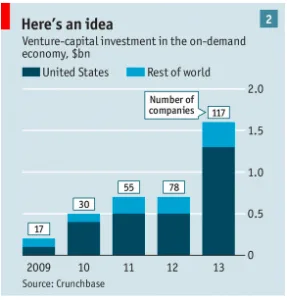 Is the very nature of work undergoing a revolution?
Is the very nature of work undergoing a revolution?
The Economist reports on the exponential growth of the “on-demand economy,” stating: “Like the moving assembly line, the idea of connecting people with freelances to solve their problems sounds simple. But, like mass production, it has profound implications for everything from the organisation of work to the nature of the social contract in a capitalist society.” Examples include Uber, Lyft, and many other businesses even in the professional services world.
The key, of course, is the mobile phone. As Benedict Evans of Andreessen Horowitz said in his must-read presentation “Mobile is Eating the World,”: Everyone now has a supercomputer in their pockets. By Evans’ count, by 2020, the multiple from continued growth in smartphone ubiquity and processing power will result in “10X the opportunity.” Not only will this reduce development costs and early capital needs, he states, but also it will help create new businesses.
Business school professors are putting a lot of energy into explaining just what the on-demand economy means for the future of work — and the organization of work.
 Thomas Malone is professor at the MIT Sloan School of Management and founding director of the MIT Center for Collective Intelligence. His book, “The Future of Work,” argues that “that a convergence of technological and economic factors—particularly the rapidly falling cost of communication—is enabling a change in business organizations as profound as the shift to democracy in governments.”
Thomas Malone is professor at the MIT Sloan School of Management and founding director of the MIT Center for Collective Intelligence. His book, “The Future of Work,” argues that “that a convergence of technological and economic factors—particularly the rapidly falling cost of communication—is enabling a change in business organizations as profound as the shift to democracy in governments.”
Other changing paradigms include “the ability to tap underused capacity,” as well as opening new areas to investment and economies of scale, according to the Economist. Further questions include whether the on-demand economy will mean lowering everyone’s status because each worker is so easily replaced, or whether it will mean a personal employment nirvana of unprecedented individual control.
Concludes The Economist: “The on-demand economy is unlikely to be a happy experience for people who value stability more than flexibility… On the other hand it is likely to benefit people who value flexibility more than security.”
